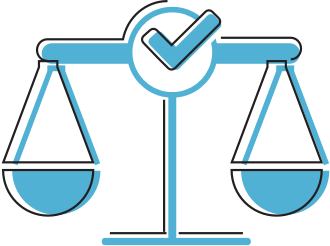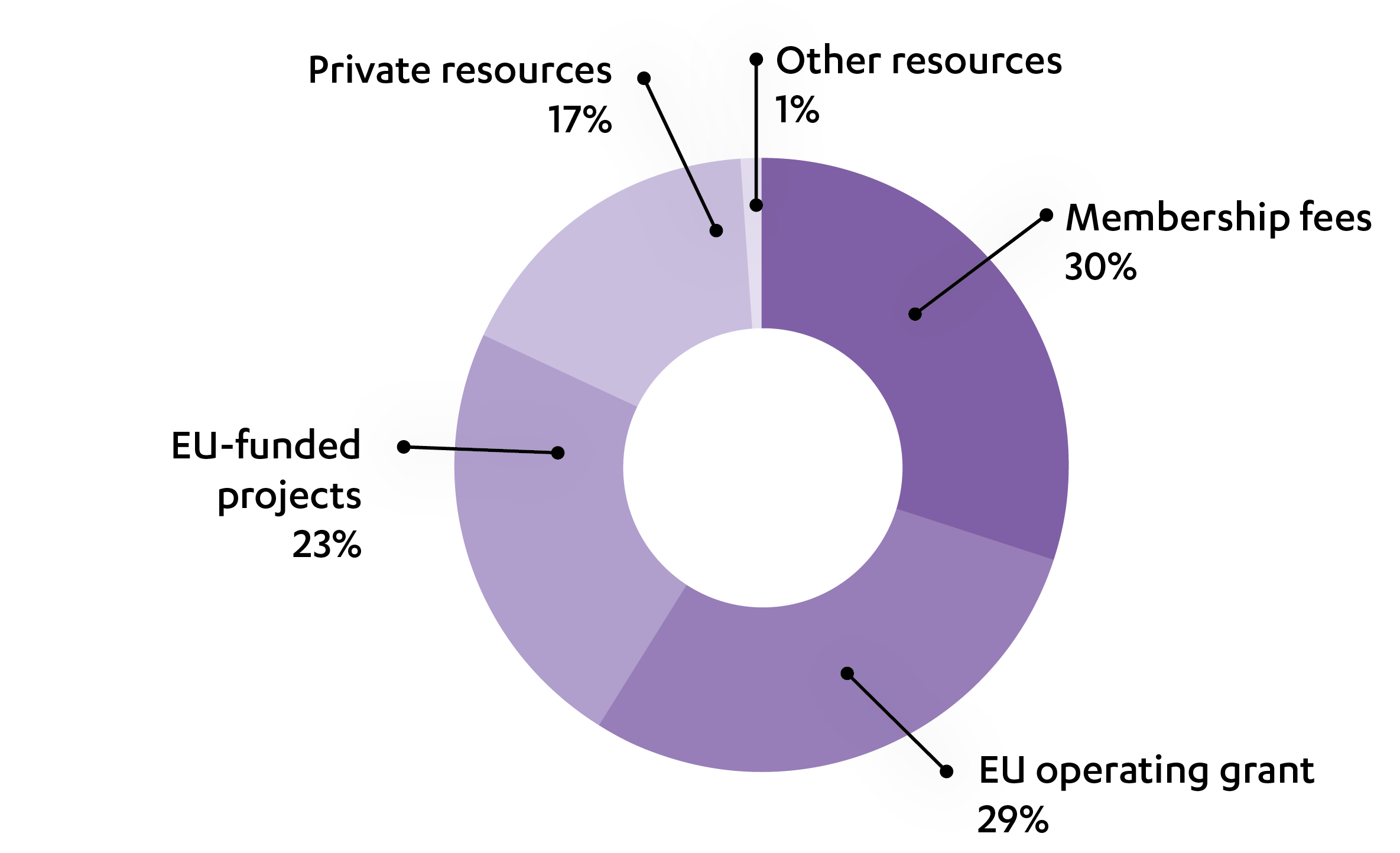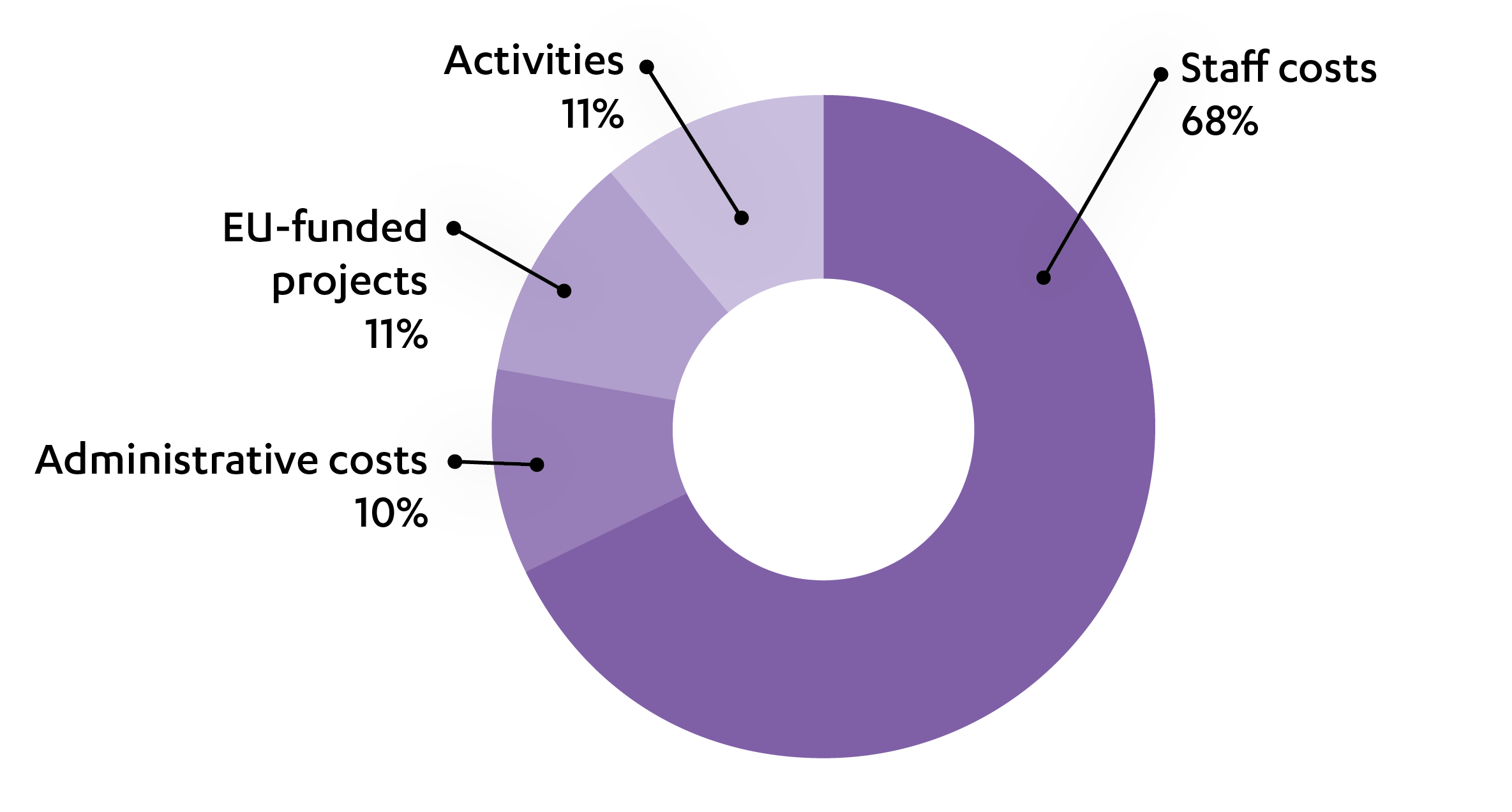

Monique GoyensDirector General

Arnold KoopmansPresident
Between a pandemic, spiralling costs of living, and – at the time of writing – a war, the start of the 2020s certainly put one's comforts into perspective.
These disruptive times bring many challenges. The underlying trends affecting people's everyday lives – digitalisation, the climate crisis – haven't changed, however. In 2021, BEUC continued to provide practical advice to help decision-makers steer Europeans through an uncertain age.
For example, we looked at what it will cost consumers to make decisions that cut CO2 emissions: Our research showed that heat pumps and electric cars are rapidly becoming the best financial option for our daily life. We also advocated to make homes more energy-efficient, and food production more sustainable. Central to our thinking is the role of regulation in giving consumers clarity, certainty, and opportunity. Taking a ‘glass half full’ approach, we issued a paper on how the EU and its partners can use climate action as an opportunity to improve people’s daily lives.
Bear in mind what is marketed as ‘sustainable’ isn't necessarily good for you or the planet. Our members for instance found toxic chemicals in non-plastic tableware. A rise in questionable corporate claims about the environmental friendliness of products and services led us to focus more on greenwashing. And when lawmakers talked about a proposal for green finance in which fossil gas and nuclear were labelled as ‘green', we did not hesitate to warn against ‘institutional greenwashing’ either.
Our tech experts had their hands full, as they worked to ensure EU legislative efforts on digital services (on the role of online intermediaries) and digital markets (on competition) will work for consumers. As the EU moves to regulate artificial intelligence, their to-do lists will remain full.
No time for tunnel vision, though: Digital laws are crucial for our future, but cannot tackle every consumer issue under the sun. For example, our members continue to see case after case of dangerous products being sold through online marketplaces. We were pleased to see the European Commission take on board our recommendations to revamp its outdated product safety legislation, which deals with who is responsible for what in the supply chain. We hope marketplaces will – finally – be held liable for what they sell.
And then there is the Achilles heel of EU law: its so-so enforcement. We pushed the powers-that-be to confront this weakness. As a result, major airlines were told to comply with EU passenger rights, and an EU Court ruled against Google for breaching antitrust rules. We also acted to enforce consumer law, by launching complaints against Nintendo, TikTok, and WhatsApp.
All the above – which is not an exhaustive list – would not be possible without the strong BEUC network. Our 46 members again provided on-the-ground evidence about issues Europeans face in their daily lives, questions they have, and what opportunities for a better future lie ahead.
In these uncertain times, it is not easy to draw conclusions or predict what’s next. 2021 therefore is best summarised as a reminder that ‘consumer policy’ is in fact ‘the policy of everyday life’.

EU Member States backed a European Commission proposal to remove all authorisations for the use of the food additive titanium dioxide (E171) in food. BEUC and other civil society organisations had raised the alarm bell over the additive’s safety already in 2019. The additive will have to be phased out by August 7, 2022.
Following a complaint by the BEUC network about systematic breaches of air passenger rights in the first half of 2020, and investigations by the European Commission and the European network of consumer authorities, 16 major European airlines committed to improve their cancellation policies and how they treat passengers in such events. This led to thousands of reimbursements to consumers in 2021 of imposed vouchers by airlines.
The European Central Bank endorsed new recommendations on consumer payments in June to help identify payment transactions on bank or card statements. This would mean consumers should know to whom a payment has been made, using the payee’s commercial trading name (i.e., the name of a shop, not the owner), as well as when and where. The rules were based on a report from a working group co-chaired by BEUC and a representative of the banking sector.
A ‘delegated act’ that activates the cybersecurity provisions of the EU’s Radio Equipment Directive was approved. When this law starts applying, in August 2024, it will force manufacturers to significantly improve the security of connected devices. It will also enable national market surveillance authorities to take insecure products off the market. BEUC actively lobbied for years to make this important cybersecurity law a reality.
To date, new medicines and medical devices are being assessed individually by Member States for their added value, and countries have only coordinated their assessments on a voluntary basis. This has often led to countries duplicating the same work. The EU has agreed to start coordinating assessment of new medicines and medical devices as of 2025, by way of a regulation on Health Technology Assessment. Thanks to this new law, which is in line with BEUC's recommendations, consumers should get improved access to the medicines they need and unnecessary costs in national health budgets will be cut. Some medicines and devices deliver greater benefits to consumers than others, so it is important that these are the ones that get reimbursed by social security.
The EU-UK trade and cooperation agreement, which echoes many of BEUC’s recommendations, entered into force in May 2021. It defines consumer welfare as a key objective. We noted it is the most ambitious EU trade agreement regarding online shopping: Traders are expected to inform consumers about the product, seller, full price, applicable consumer rights, as well as to ensure access to redress. The agreement also prevents the introduction of tariffs and quotas and foresees much-needed cooperation between EU and UK authorities on product safety.
The World Trade Organization announced that 80 countries – including the EU – agreed to include a consumer protection article in a future global e-commerce trade deal. We labelled it a “bold move”: Although not a regulatory initiative, and not creating new rights, it defines consumer protection provisions countries should have in place. Examples are clear information to consumers, easy access to redress, and ensuring that products are safe. Europeans shopping online across the world may therefore find it easier in the future to get their money back when something goes wrong.

Energy prices were already increasing rapidly across Europe in 2021, and – at the time of writing this report – this trend has shown no sign of abating. To help shield Europeans from the storm, the European Commission proposed measures which took on board many of our recommendations for the short-term: a reduction of taxation rates, preventing disconnections, and tightened regulatory oversight to prevent unfair market practices.
We published a report dispelling the myth that moving mandatory product information online will help to empower consumers. It undermines, rather than enables, informed consumer choice. Digital tools could however serve an important complementary role, by for instance helping to translate mandatory on-pack information into useful advice for consumers. Our report generated significant interest among decision makers and stakeholders alike.
We revealed that a medium-sized electric car bought in 2021 is already the most financially interesting solution over the car’s lifetime. We also found electric cars are the most ‘equitable’ engine on the market. That is because second- and third-hand owners – who bear less of the car’s depreciation and benefit from low maintenance costs – will make savings for each electric car sold in 2021 once these cars arrive on the second-hand market. This research fed into BEUC’s advocacy on EU clean car and charging infrastructure rules, and was echoed by leading policymakers.
Nine BEUC members organisations issued findings tailored to their countries: Test Achats/Test Aankoop (Belgium), Κυπριακού Συνδέσμου Καταναλωτών/Kypriakos Syndesmos Katanaloton (Cyprus), UFC-Que Choisir (France), Verbraucherzentrale Bundesverband – vzbv (Germany), Altroconsumo (Italy), Lietuvos vartotojų organizacijų aljansas – LVOA (Lithuania), DECO (Portugal), Zveza Potrošnikov Slovenije – ZPS (Slovenia), OCU (Spain).
Our compilation of four tests by BEUC members Forbrugerrådet Tænk (Denmark), UFC-Que Choisir (France), Altroconsumo (Italy), and OCU (Spain) found chemicals of concern in single-use tableware made of popular non-plastic alternatives, such as plant fibre bowls, paper straws, or palm leaf plates.
Several products were also found to mislead consumers with unsubstantiated green claims by claiming to be compostable or biodegradable. Yet, the test found that many contained ‘forever’ chemicals that may not fully degrade in nature for hundreds of years, migrating into the environment and accumulating in soil, water and living organisms. We urged the EU to ensure that single-use plastic alternatives are safe and do not mislead consumers.
Food companies’ commitment to market their products responsibly blatantly fails to protect European children from ads praising unhealthy foods, we found after conducting a snapshot survey. The report shed light on the flaws of the ‘EU Pledge’, the industry’s voluntary initiative – incl. weak nutritional criteria, the inadequate coverage of TV shows popular with children, etc. Based on our findings, we called for binding rules to restrict the marketing and advertising of unhealthy food to children, including in the digital world.
Ten BEUC members were involved in the survey: Test Aankoop/Test Achats (Belgium), Forbrugerrådet Tænk (Denmark), Consommation, logement et cadre de vie – CLCV (France), Verbraucherzentrale Bundesverband – vzbv (Germany), ΚΕ.Π.ΚΑ/KEPKA (Greece), Altroconsumo (Italy), Consumentenbond (Netherlands), DECO (Portugal), OCU (Spain), Zveza Potrošnikov Slovenije – ZPS (Slovenia).
During the world’s annual climate conference (‘COP26’), we wrote that a carbon-cutting climate policy can bring environmental, economic, and social value to the daily lives of consumers. We had noticed that – as the EU moves from words (strategies and roadmaps) to deeds (concrete legislation) of its Green Deal – some voices were ‘warning’ policymakers that ambitious climate and environmental policies will lead to social turmoil and hardship.
In response we underlined that – while certainly challenging – climate policy can improve the daily lives of people across society, provided it is well-designed. We urged the EU to regulate energy, mobility, food, consumer products, and finance in ways that allow people to make changes in their consumer lives that are currently not possible, or only to a limited degree.
The urgency of the challenge to mitigate the climate crisis will force all of us to change how we heat our homes: away from polluting sources like gas to greener and more efficient alternatives. According to a BEUC study, heat pumps will be the cheapest green heating option for consumers. They will be both more affordable and convenient for consumers than hydrogen, which is the only other non-fossil fuel solution. This report – conducted with our members dTest (Czechia), Altroconsumo (Italy), Federacja Konsumentów (Poland), and OCU (Spain) – therefore dispels the promotion of hydrogen by a part of the industry.

We criticised the EU's proposed rules for artificial intelligence, known as the ‘AI Act’, as being too focused on a very limited range of AI uses and issues. They also do not protect consumers from possible economic harm caused by AI products and services. Which is why we advocated to improve the proposed rules. This included our ‘The AI Act: Machine rule or Consumer rules?’ event. Among our recommendations is, for instance, that the scope of the AI Act should be broadened to adequately regulate AI systems other than those classified as ‘high-risk’.
The imbalance of power between consumers and data-powered traders who control digital environments creates a foundation for unfair practices. In the coming years, with the proliferation of artificial intelligence systems and biometric technologies, the position of the consumer can only be expected to become ever weaker. Consumer law as the horizontal framework protecting consumer agency is currently not fit to address such challenges.
So BEUC has been running a three-year project to adapt consumer law to the challenges of the digital and data economy. In 2021, we published a comprehensive study on structural asymmetries in digital consumer markets, followed by an addendum to the main research. These studies served as a basis for policy recommendations that BEUC published at the time of writing in 2022.
The review of EU competition policy tools for the twin digital and green transitions, rightly focuses on strong and effective competition policy and enforcement as a tool – we said. This should ensure consumers benefit from lower prices, more choice, and higher quality. At the same time, we urged the European Commission to continue to resist lobbying by big companies to weaken merger control in the name of global competitiveness.
The Digital Markets Act, or DMA, is a landmark piece of legislation to rebalance digital markets so that they are fairer and work better for Europe’s consumers. With this legislation, Europe has taken the lead globally in regulating Big Tech. The DMA sets obligations on the largest digital companies (‘gatekeepers’) to fundamentally change some of their current, hugely profitable business practices that have harmed consumers’ interests.
BEUC played an important role in highlighting the benefits for consumers of passing this legislation. For example, we ran a campaign pushing for interoperability rights for instant messaging users to be included, so that a Signal user would be able to communicate with a WhatsApp user. Interoperability rights are now in the agreed text. We were also instrumental in making it possible for consumers to launch collective redress actions if a gatekeeper fails to meet its obligations under the DMA.
The Digital Services Act, or DSA, attempts to create a safer online environment for consumers and deals with the role of intermediaries online. Existing rules are unable to cope with recurring problems consumers face in online markets, such as a flood of dangerous or illegal goods, fake ads, and scams.
BEUC is pushing hard to get due diligence obligations so that online marketplaces take responsibility for what gets sold on their platforms, including through media pressure. We also published a joint statement with a group of business, consumer and civil society organisations where we underlined the risks for consumers and businesses if small and medium online platforms were exempted from due diligence obligations. We are also in a group of civil society organisations advocating a ban on the use of tracking ads. In part thanks to our lobbying, the EU institutions are considering including a ban on the processing of personal data belonging to minors and on the processing of sensitive data for tracking advertising purposes. This file is ongoing at the time of writing in April 2022.
We teamed up with partners to urge EU and US policy-makers to tackle surveillance-based advertising. The call was signed by more than 50 consumer groups and civil society organisations from both sides of the Atlantic, as well by more than 20 academics. In a blog post, BEUC staff explained that the surveillance ads industry grew fat on the thin promise of providing more ‘relevant ads’ and ‘free’ services but it never disclosed the real cost of its practices. We highlighted issues of privacy, manipulation, discrimination, fraud, and more.
The European Commission unveiled a plan in February 2021 to turn the tide against cancer. Unhealthy diets as well as overweight and obesity are significant risk factors for cancer. We welcomed that the European Commission wants to help prevent cancer by making healthy food choices easier for consumers. One flagship measure concerns the labelling of ingredients and nutrition information on alcoholic drink labels, which BEUC has advocated for. A related EU impact assessment also considered BEUC’s views, which is to revoke the labelling exemption granted to alcoholic drinks.
In the run up to the publication of EU measures to meet climate targets, we produced a video and an infographic to promote our position on sustainable housing. We underlined that consumers are willing to play their part to future-proof their homes but face numerous hurdles. These range from a lack of reliable information, to getting access to financing. Tackling this will require policymakers to make advice and support easier to obtain and to make consumers more aware of the many benefits: from lower energy bills, increased comfort, to improved indoor air quality, and health.
We welcomed the proposal for an Energy Performance of Buildings Directive, published in December 2021. It should lead to consumers benefiting from new basic housing standards that will allow them to use less energy to heat or cool their homes.
2021 saw a lot of back-and-forth on the topic of sustainable finance. BEUC is a member of an expert group looking into qualifying what type of investments can be labelled as sustainable (known as the ‘EU Taxonomy’). We were vocal in the media about Europe being on the wrong track, criticising its Renewed Sustainable Finance Strategy when unveiled in July. This strategy’s positive elements (promoting green mortgages) were overshadowed by a proposal to label energy sources like fossil gas and nuclear as ‘green’. In BEUC’s view, this institutional greenwashing would be misleading for consumers and deviate much-needed capital away from truly sustainable solutions.
Consumers have for far too long been preyed upon by loan sharks aiming to exploit society’s most vulnerable people with loans with extortionate rates. With many still feeling the financial effects of COVID-19, we therefore praised plans to revamp the Consumer Credit Directive as coming “just at the right time”.
The current consumer credit law dates to 2008 and originally focused on the need for lenders to provide appropriate information to consumers. However, it has failed to keep pace with developments in financial services, like digitalisation and the rise of predatory products like short-term high-cost credit. The EU’s proposals took on board BEUC’s recommendations on small loans and Buy Now Pay Later products, to name just a few.
At the start of summer, the European Commission proposed measures to cut greenhouse gas emissions 55% by 2030. Known as ‘Fit for 55’, this initiative will impact consumers’ lives in terms of mobility, taxation, heating, and home renovation. Many of the proposals are in line with BEUC’s recommendations, incl. strengthening consumer rights in energy markets, accelerating the roll-out of renewable energy, and ending the sale of new diesel and petrol vehicles by 2035.
As online shopping increases, so does the number of unsafe products on offer. We continued to outline this issue, supported by data from across our network. This fed into our advocacy ahead of, and following, a European Commission proposal for a new regulation on consumer product safety. This proposal includes almost all the policy suggestions by BEUC and our colleagues at standards advocacy group ANEC. Examples are improving market surveillance for all consumer products, enhancing traceability across the supply chain, and addressing the security of products.
We showed our support for the EU’s ‘Farm to Fork’ plans. This included a video message calling on Members of the European Parliament to vote for an ambitious report. We also co-authored an opinion piece countering attacks on the EU’s plans. This followed us joining 24 organisations within the ‘Food Policy Coalition’ to set out ten priorities we advised Parliament to endorse.
We were pleased to see Parliament vote to support greener food production. Lawmakers voted for binding targets to cut back on pesticides, fertilisers and antimicrobials in farming. Echoing BEUC’s recommendations, Parliament also called for healthier food environments, and backed an EU-wide simplified nutritional label to help consumers choose healthier foods.
Trade policy may sound like an abstract thing, but it can define every aspect of our lives in both positive and negative ways. Which is why the EU’s 2021 review of its trade policy is important. We commented that the review contains good points for consumers. It reflects BEUC’s recommendations on the need for more international cooperation, and for coherence between internal and external EU policies. BEUC urged the EU to now “take the bull by the horns” and push for a reform of archaic World Trade Organization rules so that consumer protection measures, such as labelling or right to repair, can no longer be perceived as ‘barriers to trade’.
The EU and US moved ahead with rolling out a new ‘cooperation agenda’, composed of voluntary dialogues between authorities. Together with the Transatlantic Consumer Dialogue (TACD) network, we issued recommendations on how these dialogues could improve consumer markets. Ahead of the first meeting of the EU-US Trade & Technology Council – which is one of these dialogues – we called for discussions that deliver to consumers, are transparent, and clearly explained to the public. This led to BEUC being invited to speak at a civil society session chaired by two European Commission Vice-Presidents and two high-level US government officials.
Together with automobile club Fédération Internationale de l’Automobile (FIA Region 1) we urged the European Commission to launch a long overdue legislative proposal on access to in-vehicle data. In our view, this law should enshrine principles allowing consumers and the service providers they have selected to control and manage flows of the data we generate while using a car. This should also include the innovative services related to a car’s use, such as ‘pay as you drive’ insurance schemes, information about repair and maintenance of spare parts, and real-time traffic information. In the absence of such a law, the risk is that car manufacturers impose their preferred technical solutions to the detriment of everyone else.
Together with the environmental NGOs European Environmental Bureau and ECOS we wrote to the European Commission to argue for a simple and clear label that can help consumers easily identify the most efficient space and water heating appliances. This happened after certain stakeholders argued in favour of separate energy labelling scales for different types of heaters. We said the introduction of such scales would unnecessarily complicate the energy label and mislead consumers into thinking, for instance, that fossil fuel technologies can be as efficient as heat pumps.
In light of the COVID-19 crisis, the EU decided to set up a health crisis authority (known as HERA). The idea is to avoid the frailties that the pandemic cruelly exposed in early 2020, when supply chains were severely disrupted and there were shortages of medicines in intensive care units and protective equipment such as masks. We commented this authority must be public interest-driven from the early stages of research and development of medicines and equipment to their production and procurement. We also said it is crucial that HERA works for a good return on investment – for consumers and public health systems – when public money is used to develop vaccines, therapies, and medical equipment.

In January, following nearly 25,000 complaints from European consumers, BEUC and its members submitted a complaint about Nintendo to the European Commission and national consumer protection authorities for systematic problems with the functionality of the Nintendo Switch console. We wrote that Nintendo’s practices are of such nature that they mislead consumers, stimulate the acquisition of new products, boosting artificially the sales and resulting in unnecessary electronic waste.
10 BEUC members participated in the action: Test Achats/Test Aankoop (Belgium), UFC-Que Choisir (France), Ε.Κ.ΠΟΙ.ΖΩ/EKPIZO (Greece), ΚΕ.Π.ΚΑ/KEPKA (Greece), Consumatori Italiani per l'Europa – CIE (Italy), Consumentenbond (The Netherlands), Forbrukerrådet (Norway), DECO (Portugal), Spoločnosť ochrany spotrebiteľov Poprad – S.O.S. (Slovakia), Zveza Potrošnikov Slovenije – ZPS (Slovenia).
We filed a complaint in February with the European Commission and the European network of consumer authorities against TikTok, a video sharing platform extremely popular with children and teenagers. Based on research findings we contended that TikTok falls foul of multiple EU consumer rights and fails to protect children from hidden advertising and inappropriate content.
18 BEUC members were involved in this action, namely: Test Achats/Test Ankoop (Belgium), Κυπριακού Συνδέσμου Καταναλωτών/Kypriakos Syndesmos Katanaloton (Cyprus), dTest (Czechia), Forbrugerrådet Tænk (Denmark), UFC-Que Choisir (France), Verbraucherzentrale Bundesverband – vzbv (Germany), Ε.Κ.ΠΟΙ.ΖΩ/EKPIZO (Greece), Altroconsumo (Italy), Consumatori Italiani per l'Europa – CIE (Italy), Consumentenbond (The Netherlands), Forbrukerrådet (Norway), Spoločnosť ochrany spotrebiteľov Poprad – S.O.S (Slovakia), Zveza Potrošnikov Slovenije – ZPS (Slovenia), Sveriges Konsumenter (Sweden), OCU (Spain), Asufin (Spain), Fédération Romande des consommateurs (Switzerland).
In July, we filed a complaint with the European Commission and the European network of consumer authorities against WhatsApp for multiple breaches of EU consumer rights. We criticised the persistent, recurrent, and intrusive notifications pushing users to accept WhatsApp’s policy updates. In addition, we highlighted the opacity of the new terms and the fact that WhatsApp has failed to explain in plain and intelligible language the nature of the changes. In September, we informed the European Commission that the practices highlighted in the alert (e.g., the recurrent notifications sent to users) were still taking place.
Eight BEUC members were involved in this action, namely: dTest (Czechia), UFC-Que Choisir (France), Ε.Κ.ΠΟΙ.ΖΩ/EKPIZO (Greece), ΚΕ.Π.ΚΑ/KEPKA (Greece), Consumentenbond (The Netherlands), Forbrukerrådet (Norway), Asociatia Pro Consumatori – APC (Romania), Spoločnosť ochrany spotrebiteľov Poprad – S.O.S (Slovakia).
We applauded a November ruling by the EU’s General Court ruling on the Google Shopping case. The Court upheld the European Commission’s 2017 decision that Google broke EU antitrust rules by abusing its market dominance as a search engine by unfairly promoting its own comparison shopping service. BEUC was a complainant against Google during the administrative proceedings and intervened before the General Court in support of the Commission decision. This case sets an important precedent for future consumer-facing competition cases in digital markets. We should note Google is appealing the decision at the time of writing, so ‘to be continued…’

Our ConsumerPRO capacity building project for consumer protection professionals in the EU, Iceland, and Norway continued in 2021. Since its start, it helped train nearly 1,200 peers from hundreds of different consumer organisations, authorities and European Consumer Centres. Be they policy experts, lawyers, consumer advisors, enforcers, communicators, or educators – professionals are now better equipped with the skills and knowledge to support consumers and to set up partnerships with each other.
We launched CLEAR-X, an EU Horizon 2020-funded project, which provides consumers with trusted information, collective purchase schemes, and an improved regulatory framework. We will now focus on Central and Eastern Europe and engage 38,000 consumers to trigger €27m worth of renewable installations.
This project is led by our sister organisation International Consumer Research & Testing (ICRT) and seven national consumer organisations: Асоциация Активни потребители/Asotsiatsiya Aktivni Potrebiteli (Bulgaria), Κυπριακού Συνδέσμου Καταναλωτών/Kypriakos Syndesmos Katanaloton (Cyprus), Lietuvos vartotojų organizacijų aljansas – LVOA (Lithuania), Организација на потрошувачите на Македонија/Organizacija na potrosuvacite na Makedonija – OPM (North Macedonia), DECO Proteste (Portugal), Spoločnosť ochrany spotrebiteľov Poprad – S.O.S (Slovakia), Zveza Potrošnikov Slovenije – ZPS (Slovenia).
BEUC renewed its ongoing projects with the European Climate Foundation (ECF) and the European Environment and Health Initiative (EEHI). Our collaboration with ECF now includes work on topics such as sustainable finance, housing renovation, decarbonisation of energy markets and the transition towards a more sustainable mobility system. Our work with EEHI focuses on tackling the exposure of consumers to endocrine disrupting chemicals. In addition to ongoing projects, BEUC worked with funders to launch projects designed to specifically build an evidence base for topics such as the decarbonisation of heating in the EU (with ECF), and our collaboration with Zero Waste Europe on testing for dangerous chemicals in day-to-day consumer products.
With all eyes in Brussels set on the EU’s Green Deal plans, we promoted an online tool – called ‘MILE21’ – that allows drivers to keep track of their own fuel use and gives them tips to reduce it. We underlined that easy comparison of real-world values is vital for consumers to choose the cleanest and most efficient models. But information at the point of sale – in the form of the EU’s car labelling scheme – is lacklustre. And yet this information is part and parcel of making EU climate policy a success, which must be achieved in the real world and not a laboratory.
Four national consumer organisations led the MILE21 project: Test Achats/Test Aankoop (Belgium), Altroconsumo (Italy), DECO Proteste (Portugal), and OCU (Spain) alongside a wider consortium. MILE21 was co-funded by the LIFE Programme of the European Union (LIFE17 GIC/GR/000128).

We issued 51 press releases and were in touch with journalists 263 times, which led to over 6,600 quotes in written press.
In addition, we gave 55 in-depth interviews to media outlets.
BEUC staff spoke at a total of 242 public events across all our topics.
We had two meetings with European Commissioners, four meetings with European Commission Directors-General, and 208 meetings with European Commission staff from a variety of departments that work on consumer-related topics.
We organised nine events as part of our #ConsumerDebates series. These concerned affordable medicines, safe products, cheap electric cars, the digital transition, sustainable non-plastic food packaging, greenwashing, artificial intelligence, consumer loans, and heating decarbonisation.
We are proud to have hosted a conversation between European Commissioner Thierry Breton and several CEOs of national consumer groups in the BEUC network. They discussed the consumer perspective related to artificial intelligence, cybersecurity, and the Digital Services Act.
On our blog – the Consumer Corner – staff from the BEUC Secretariat in Brussels or national consumer organisations gave their views on: air pollution hot spots, the EU-UK trade deal, financial hurdles to home renovation, high electricity prices, the road to a sustainable lifestyle, Google’s market dominance, a ‘post-COVID’ world, charging payment issues faced by electric car drivers, the importance of one-stop-shops in home renovation, specific practices by gatekeeper platforms that control digital markets, banning surveillance ads, bad financial advice, and greenwashing.

It is our policy to seek funding in priority areas identified by our members as important for consumers. This funding can be either unrestricted (to support our core work) or tied to a specific project or programme. All potential funders are carefully vetted through our due diligence process to ensure that they align with our goals and do not threaten our integrity and independence.
This grant is received from the European Commission’s Consumer Programme 2014-2020.
DG Climate & LIFE Programme
EASME
DG Justice & CHAFEA
DG Energy
DG Environment
European Climate Foundation
Open Society Foundations
The European Environmental Health Initiative
Adessium Foundation
Omidyar Network
Ford Foundation
Luminate Foundation
Our income in 2021 was €6,689,895. This includes:
| Resources 2021 | (in euros) | Expenditure 2021 | (in euros) |
|---|---|---|---|
| Membership Fees | 1,993,440 | Staff costs | 4,249,120 |
| EU Operating grant | 1,923,650 | Administrative costs | 622,022 |
| EU-funded projects | 1,538,493 | Activities | 693,068 |
| Private resources | 1,124,217 | EU-funded projects | 675,506 |
| Other resources | 110,095 | ||
| Total resources | 6,689,895 | Total expenditure | 6,239,716 |



Made by Exelmans Graphics